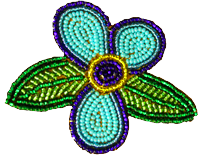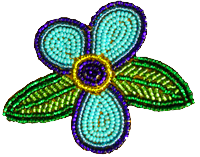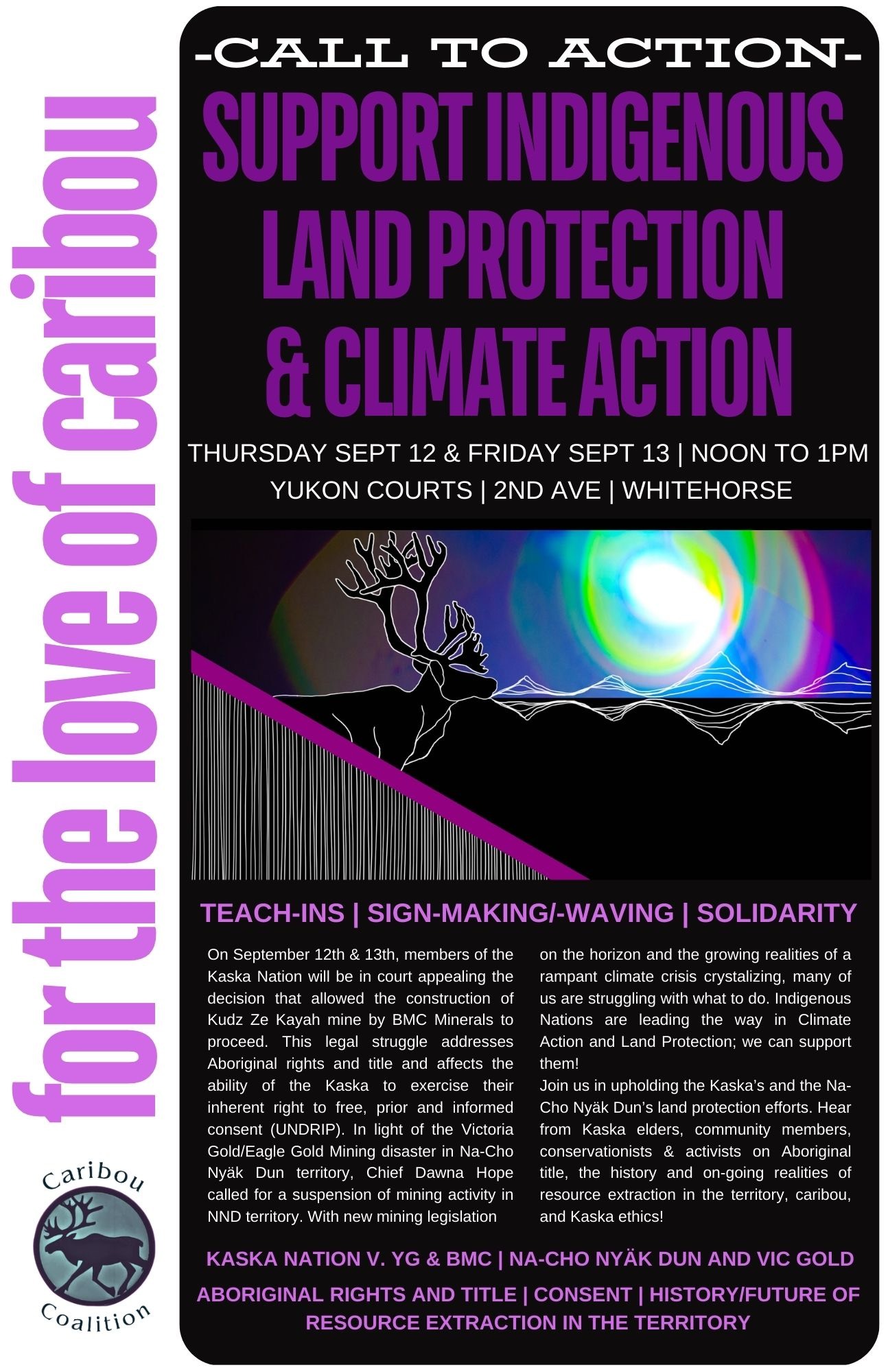Kudz Ze Kayah Mine
The Yukon Government recently approved the Kudz Ze Kayah mine, an open-pit copper/lead/zinc mine slated for development in Kaska territory, despite firm opposition from Kaska First Nations, on whose unceded lands it sits. We at the Liard Aboriginal Women’s Society have grave concerns about how the mine will impact the land, caribou, Kaska culture, families, and rights.
Kudz ze kayah means “caribou country” in the Kaska language. The name itself is an insult and co-optation of the Kaska language. The impacts of the project are already being felt: dust and dangerous driving on the road, man camps (see LAWS report outlining violence associated with man camps), and division within Kaska families and communities.
In light of the decision to allow BMC’s mine to move forward on Kaska lands, without proper consent for the location of the mine, and false promises by the government to resolve any lingering concerns, the LAWS leadership is looking to explore other ways to stop the destruction of their land.
Sign up here to receive calls to action from near and far to join the Liard Aboriginal Women's Society and Kaska Nation against the destruction of their land.
Click on the image of the poster to view full size
About the mine
BMC Minerals Ltd. has started mine and road construction already. They are planning an open pit and underground copper, lead, zinc, silver and gold mine approximately 115 km southwest of Ross River, Yukon. The Kudz Ze Kayah (KZK) Mine will produce an average of 180,000 tonnes of zinc, 35,000 t of copper and 25,000 t lead concentrates annually and is expected to be in operation for a minimum of 10 years.
Mining activities include water management infrastructure, a tailings facility, and waste rock storage facilities. Access to the mine site will be by air and by ground. Ground traffic will be by the existing Tote Road, which is approximately 24 km in length and extends from the Robert Campbell Highway, south to the Mine site. The Campbell HIghway is narrow and a main travel corridor for Kaska people into the area. The mine is slated to dramatically increase traffic on this highway, decreasing safety.
Kaska opposition to KZK
KZK is opposed by the two Kaska First Nations on whose unceded land it is to be built, whose territory already hosts several toxic abandoned mines. The approval violates our rights to decision-making about our lands and undermines our well-being, which is directly tied to the health of the land. If built, the mine will operate for as little as 9-10 years, but will destroy a sacred place we regard as our “breadbasket”, essential to both human and caribou well-being. Our Elders say the caribou here, now called the Finlayson herd, were once so abundant that when caribou were close, “the whole ground would shake.”
Today, these caribou, core to our way of life, are rarely seen. Kudz Ze Kayah will have significant and irreversible impacts on the diminished herd, who calve right where the mine is being built. Along with the Liard First Nation, we at LAWS believe that Kudz Ze Kayah poses an existential threat to the Finalyson herd.
While we do believe that some mines can be built safely in some locations, Kudz Ze Kayah is not one of them. Canada’s own laws recognize our rights to our lands and resources, which means that the government must seek our free, prior, and informed consent over developments on those lands. We have a right to say no to this mine, and have clearly done so.
Impacts of the mine
For too long, the persistent myth of ‘uninhabited’ or ‘wilderness’ land has led to misguided and devastating impacts on Indigenous peoples, wild animals and the land. This mine is being built on our homeland, where trails, hunting routes, birthing and grave sites, and traditional knowledge of plants, landscapes and hunting practices goes back generations.
On-going colonization and the genocide of residential schools have eroded the land and land-based activities that sustain the Kaska people. The connection to and return to traditional practices on the land is now being rebuilt and revitalized under the guidance of Kaska Elders. Kaska Elders, especially women, have a strong vision for a revitalization and renewal of Kaska ways through healing, dignity, culture and fierce resistance to ongoing impacts of the colonial project.
Regulatory systems do not attend to these values and practices. They measure impacts and benefits in very narrow terms. But even within the constrained terms of environmental assessment, the project’s impacts have been shown to be devastating:
- Clear dangers to the Finlayson caribou herd, whose numbers are already in decline. The project’s own report states that the project will have significant impact on the herd and its long-term viability. Key habitat areas and migratory routes would be severely impacted by mine development.
- Water impacts on streams, lakes and rivers. These impacts can last for decades after the mine closes.
- Impacts on access to land, trails, hunting and traditional use
- Harm to the land and cultural activities on the land
BMC states that these risks can be mitigated. The experience of Kaska people -and all Yukoners – is that large-scale open-pit mining projects leave a legacy: an expensive and devastating one. An open-pit mine in the calving grounds of an already-struggling caribou herd is simply not mitigable.
Yukon has yet to undertake regional land use planning in Kaska territory. A properly executed planning process would be able to identify in a systematic way ALL the values for this region, not just those values deemed significant by the resource extraction industry.
It is important to balance the short-term gain of economic activity (which mostly goes to corporate and shareholder profits far from the southeast Yukon) with long-term loss if the quality of water and wildlife is diminished for future generations of Kaska people. The abandoned and ecologically damaging Wolverine Mine is an example of this. Once habitat and water quality are damaged the long-term viability of the ecosystem is affected for decades.
About the approval process
This is not the first mine to be approved on Kaska lands through a flawed and rushed regulatory process. The KZK approval process was particularly egregious, however, including:
- A rushed initial screening process that did not fully or significantly involve the Kaska nations who will be most affected;
- Despite lack of engagement with Kaska nations, the project screening report stated that there WILL be significant adverse effects to water resources, wildlife, traditional land use, economy, and human health and safety;
- Recognizing this, the federal government sent the initial mine proposal back for further review, stating there was insufficient evidence that the predicted impacts to caribou could be mitigated and insufficient attention to Kaska rights. But the Yukon Environmental and Socioeconomic Assessment Board re-issued a recommendation to approve the mine.
- Kaska successfully challenged the decision in court, alleging the federal duty to consult them had not been fulfilled. BMC was ordered to engage in more robust consultation. BMC then held a two-day meeting with Kaska people, during which Elders and community leaders reiterated their opposition to the project. Shortly after, the Yukon and federal governments approved the mine, finding this consultation sufficient.
The mine was approved in April 2024 and construction is now in full force. (Although it is important to note that piecemeal construction began several years ago, prior to the mine being approved).
Canada positions itself as a “world leader” in environmentally sustainable and socially-just mining, anchored in “respect for Indigenous and treaty rights.” The Kudz Ze Kayah approval flies in the face of these claims.
What we want
The Kaska have a right as an Indigenous nation to exercise their traditional economic and cultural practices on all parts of their territory. They also have a right to not only participate in but to lead land use planning and resources management for land that they have stewarded for generations. We seek true decision-making power over projects and resource-extraction on Kaska land, as well as for any conservation projects. We need our inherent right to and access to the land to be respected.
Support needed!
We seek connections and support from scientists and researchers - please reach out before and during research, and share results with communities. Researchers must involve Indigenous knowledge-keepers in all work.
We need support to work through conventional channels (environmental assessment processes, courts) and also activism and resistance – (rallies, solidarity, direct action).
Sign up here to receive calls to action from near and far to join the Liard Aboriginal Women's Society and Kaska Nation against the destruction of our land.
 Liard Aboriginal Women's Society
Liard Aboriginal Women's Society 
